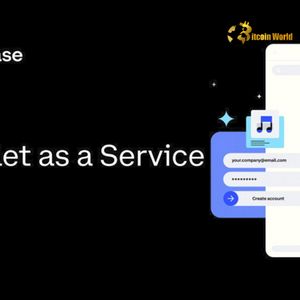Empowering Web3: Coinbase Developer Wallets Arrive
7 min read
BitcoinWorld Empowering Web3: Coinbase Developer Wallets Arrive Big news for builders in the blockchain space! Coinbase, a leading name in the crypto industry, has just rolled out a significant new offering designed specifically for developers and businesses looking to integrate crypto functionality into their applications. This isn’t just another user-facing wallet; it’s a powerful piece of Web3 infrastructure aimed at simplifying one of the most complex aspects of decentralized application development: wallet management. Dubbed ‘CDP Wallets’ (though more broadly referred to as Coinbase Developer Wallets ), this new service provides a robust, API-driven infrastructure. Think of it as a backend service that allows developers to programmatically create and manage wallets for their users or applications without ever having to touch sensitive private keys or build complex wallet infrastructure from scratch. This is a potential game-changer for speeding up Web3 adoption and making it easier for traditional companies and startups alike to enter the space. What Makes Coinbase Developer Wallets Different? Traditionally, building an application that interacts with blockchain requires managing wallets. This involves handling private keys, ensuring their security, managing gas fees, tracking transactions, and dealing with various network complexities. It’s a significant burden that requires specialized expertise and introduces considerable security risks. Coinbase Developer Wallets aim to abstract away these complexities. Here’s a breakdown of the core concept: API-First Approach: Developers interact with the wallet infrastructure through a set of well-documented APIs. This means standard coding calls, not deep blockchain node management. Programmable Functionality: The wallets aren’t just passive storage. They are designed to be programmable, allowing developers to automate transactions, interact with smart contracts, and integrate wallet actions directly into their application logic. This is key for building dynamic Web3 experiences. Abstracted Key Management: Perhaps the most significant feature is that developers do not directly handle or store the private keys for the wallets they create using this service. Coinbase manages the underlying key infrastructure securely, reducing the developer’s security surface area and compliance burden. Scalability: Built on Coinbase’s existing robust infrastructure, the service is designed to scale with the needs of growing applications. Why Are Programmable Wallets a Game-Changer for Developers? The ability to have Programmable Wallets opens up a world of possibilities that were previously difficult or risky to implement. For many applications, you don’t just need a place to hold assets; you need wallets that can *do* things automatically based on application logic. Consider these scenarios: Gaming: Automatically distributing in-game rewards (tokens or NFTs) to player wallets based on achievements. Marketplaces: Facilitating escrow services or automated payments between buyers and sellers upon fulfillment conditions. DeFi Protocols: Allowing applications to execute complex DeFi strategies on behalf of users (with their permission) without requiring constant manual interaction. Loyalty Programs: Issuing tokenized loyalty points or rewards to customers seamlessly as part of their purchase or interaction history. Before programmable infrastructure like this, implementing such features often required developers to build complex backend systems for transaction signing and key management, which is both time-consuming and prone to errors and security breaches. Programmable Wallets shift the focus from infrastructure plumbing to building core application features. Leveraging the Crypto API for Seamless Integration The foundation of the Coinbase Developer Wallets offering is its Crypto API . APIs (Application Programming Interfaces) are the standard way software applications talk to each other. By providing a comprehensive API, Coinbase allows developers to integrate wallet creation, management, and transaction initiation into their existing backend systems using familiar programming paradigms. Instead of needing deep knowledge of blockchain nodes, transaction formats for various chains, gas estimation, and private key cryptography, developers can use simple API calls like: createWallet() sendTransaction(walletId, recipientAddress, amount, tokenType) getWalletBalance(walletId) listTransactions(walletId) signMessage(walletId, message) This significantly lowers the barrier to entry for developers who are new to Web3 but experienced in traditional software development. The Crypto API handles the underlying blockchain interactions, making the process much smoother and faster. Addressing Core Web3 Infrastructure Challenges Building reliable and scalable Web3 applications involves more than just writing smart contracts. The Web3 Infrastructure layer – including nodes, transaction relays, gas management, and data indexing – is notoriously complex and expensive to manage. Many companies struggle with the operational overhead and technical debt associated with maintaining this infrastructure. Coinbase Developer Wallets tackle several of these challenges head-on: Challenges Addressed by Coinbase Developer Wallets: Challenge How CDP Wallets Help Private Key Security Coinbase manages keys in secure environments, removing the burden from developers. Blockchain Node Management Developers interact via API, abstracting away the need to run or manage nodes. Transaction Reliability Infrastructure handles transaction broadcasting, retries, and monitoring. Multi-Chain Complexity A single API interface can potentially support multiple blockchain networks over time. Scalability Issues Leverages Coinbase’s scalable backend infrastructure. By providing a managed wallet service as part of its broader Web3 Infrastructure offerings (like Coinbase Cloud), Coinbase allows businesses to focus on their core product or service rather than becoming blockchain infrastructure experts. How Does This Ensure a Secure Wallet Environment? Security is paramount in the crypto space, and managing private keys is arguably the biggest security challenge. A single mistake can lead to the loss of all assets associated with a wallet. By offering a Secure Wallet solution where Coinbase handles the private key management, developers can significantly reduce their risk exposure. Coinbase has years of experience in securing digital assets at scale. They employ sophisticated security measures, including hardware security modules (HSMs), multi-party computation (MPC), strict access controls, and ongoing security audits. While developers still need to secure their own API keys and application backend, they are no longer responsible for the cryptographic keys that directly control the funds within the wallets created via the service. This model provides a different security profile compared to self-custodial solutions where the user holds their keys or developer-managed custodial solutions where the developer holds the keys. For many applications, especially those targeting mainstream users or businesses where ease of use and regulatory compliance are critical, a managed, Secure Wallet infrastructure like this offers a compelling trade-off. Benefits for Developers and Businesses Let’s summarize the key advantages of using Coinbase Developer Wallets : Accelerated Development: Get to market faster by using pre-built, reliable wallet infrastructure. Reduced Security Burden: Offload private key management to a specialized, secure provider. Lower Operational Costs: Avoid the expense and complexity of running and maintaining your own blockchain nodes and wallet systems. Enhanced Functionality: Easily integrate programmable wallet actions into your application logic via a simple Crypto API . Focus on Innovation: Free up your development team to build unique features and user experiences instead of infrastructure. Scalability: Rely on Coinbase’s battle-tested infrastructure to grow with your application. Potential Considerations and Challenges While the benefits are significant, it’s important to consider potential challenges: Centralization: Relying on Coinbase introduces a degree of centralization, which might be a philosophical concern for some in the Web3 space. Cost: While potentially cheaper than building from scratch, there will be costs associated with using the service (likely based on API calls, transactions, or number of wallets). Customization Limitations: A managed service might not offer the same level of granular control as a self-built solution. Vendor Lock-in: Migrating away from the service later could present challenges. Learning Curve: Developers still need to learn the specific Coinbase API and best practices for interacting with the service. Businesses and developers should carefully evaluate these points against their specific needs, technical capabilities, and risk tolerance. Examples of What You Can Build The possibilities are vast. Here are a few concrete examples where Coinbase Developer Wallets could be instrumental: Application Type How CDP Wallets Fit In Simplified Process NFT Marketplace Creating wallets for users upon signup, handling automated minting and transfer fees. No need to manage individual user private keys or run minting nodes. Web3 Gaming Platform Issuing in-game currency or item tokens, managing player balances, facilitating peer-to-peer trades. Automated token distribution and secure player asset management via API. Decentralized Social Media Allowing users to earn tokens for content, tipping creators, managing token-gated access. Easy token transfers and balance tracking integrated into the social platform. Supply Chain Solution Recording asset transfers or events on-chain, managing tokenized inventory. Programmable transactions triggered by real-world events, managed securely. These are just a few examples, highlighting how abstracting wallet infrastructure allows developers to focus on the unique value proposition of their application. Actionable Insights for Developers If you’re a developer or business looking to build in the Web3 space, here’s what you should consider: Explore the Documentation: Head over to the Coinbase Cloud documentation to understand the CDP Wallets features, supported chains, and API specifications in detail. Start Small: Consider integrating the service for a specific feature or a pilot project to evaluate its suitability for your needs. Assess Costs: Understand the pricing model to factor it into your project’s budget. Security Best Practices: While Coinbase handles key management, ensure your own application’s security, especially around API key management and user authentication. Evaluate Trade-offs: Weigh the benefits of speed and reduced complexity against the implications of using a centralized, managed service. This launch signifies a maturing of the Web3 ecosystem, where infrastructure providers are stepping up to offer services that make development more accessible and secure. Conclusion: A Step Towards Mass Adoption? The introduction of Coinbase Developer Wallets is a significant development. By offering a secure, programmable, and API-driven wallet infrastructure that removes the burden of private key management and complex node operations, Coinbase is directly addressing major pain points for developers and businesses building in Web3. This move has the potential to lower the barrier to entry, accelerate innovation, and pave the way for more sophisticated and user-friendly decentralized applications. While considerations around centralization and cost remain, the promise of simplified development and enhanced security offered by these Programmable Wallets built on robust Web3 Infrastructure is compelling. As the ecosystem continues to evolve, solutions like this, leveraging a powerful Crypto API , will likely play a crucial role in bringing Web3 technology to a wider audience, ensuring a more Secure Wallet future for integrated applications. To learn more about the latest Web3 development trends, explore our article on key developments shaping crypto infrastructure. This post Empowering Web3: Coinbase Developer Wallets Arrive first appeared on BitcoinWorld and is written by Editorial Team

Source: Bitcoin World



